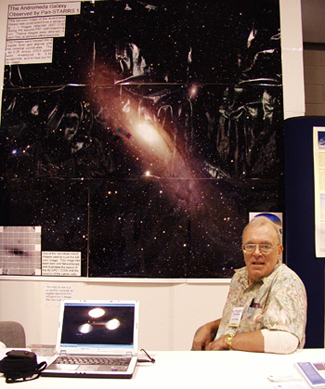 I was checking out the exhibitors at this week’s American Astronomical Society meeting in Austin, Texas, and trying hard to avoid information overload. The booth for the Pan-STARRS project stopped me in mid-stride. In fact, I may have actually done a double-take.
I was checking out the exhibitors at this week’s American Astronomical Society meeting in Austin, Texas, and trying hard to avoid information overload. The booth for the Pan-STARRS project stopped me in mid-stride. In fact, I may have actually done a double-take.
There, a giant poster of the Andromeda Galaxy (M31) formed the booth’s backdrop. Only this wasn’t a poster. It was an image taken with the 1.4-billion-pixel charge-coupled-device camera on the Pan-STARRS prototype telescope.
And the print was less than half its actual size.
“We keep apologizing for having to make it so small,” the University of Hawaii’s Paul Price said with a grin. “The wall isn’t high enough to show it full size.”
Pan-STARRS — the Panoramic Survey Telescope and Rapid Response System — is a wide-field survey project designed to detect asteroids and comets that could pose a threat to Earth. The PS1 prototype, located on Haleakala, Maui, is essentially one-quarter of Pan-STARRS, which will combine four such units.
The PS1 and its 1.4 Gigapixel Camera will scan the sky for the next 3 years to test the technology and pave the way for Pan-STARRS. In fact, astronomers expect PS1 will be able to scan the entire visible sky to between magnitude 22 and 23 in less than a week, depending on the filter used and how much moonlight interferes.
“The Gigapixel Camera is working great,” said James Heasley, also from the University of Hawaii. A series of exposures taken during the PS1’s December 2007 commissioning run were combined to make the full-color image.
The Andromeda Galaxy will be getting a lot more attention, too. “Our intent is to observe M31 at every opportunity,” explained Price. “We’ll create the deepest, most detailed record of this galaxy yet.”